Related Research Articles

Beginning in December 2012, Sunnis in Iraq protested against the Maliki government. On 28 December 2013, a Sunni MP named Ahmed al-Alwani was arrested in a raid on his home in Ramadi. Alwani was a prominent supporter of the anti-government protests. This incident led to violence in Al Anbar Governorate between the Iraqi Army and a loose alliance of tribal militias and other groups fighting alongside the Islamic State of Iraq and the Levant (ISIL).
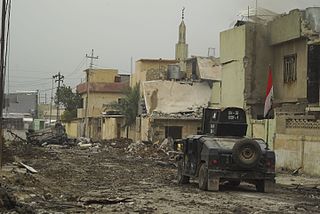
The War in Iraq was an armed conflict between Iraq and its allies and the Islamic State which began in 2013 and ended in December 2017. Following December 2013, the insurgency escalated into full-scale guerrilla warfare following clashes in the cities of Ramadi and Fallujah in parts of western Iraq, and culminated in the Islamic State offensive into Iraq in June 2014, which lead to the capture of the cities of Mosul, Tikrit and other cities in western and northern Iraq by the Islamic State. Between 4–9 June 2014, the city of Mosul was attacked and later fell; following this, Prime Minister Nuri al-Maliki called for a national state of emergency on 10 June. However, despite the security crisis, Iraq's parliament did not allow Maliki to declare a state of emergency; many legislators boycotted the session because they opposed expanding the prime minister's powers. Ali Ghaidan, a former military commander in Mosul, accused al-Maliki of being the one who issued the order to withdraw from the city of Mosul. At its height, ISIL held 56,000 square kilometers of Iraqi territory, containing 4.5 million citizens.
The Battle of Ramadi, also called the Fall of Ramadi, was part of an ISIL offensive to capture all of the Anbar Province. Ramadi was one of the Iraqi government's last strongholds in Anbar, after ISIL's success in a previous campaign. The battle began in November 2014, and drew to a close on 14 May 2015, as Islamic State of Iraq and the Levant (ISIL) insurgents seized hold of government buildings. On 17 May, the Iraqi Army and special forces fled the city, with 500 civilians and security personnel dead.
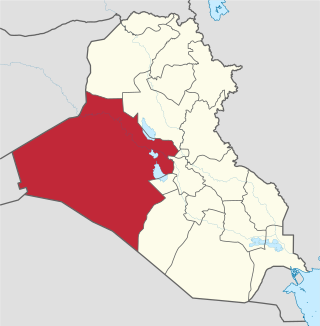
The Al-Karmah offensive, codenamed Fajr al-Karma, was an offensive launched by the Iraqi Army and anti-ISIL Sunni tribal fighters to recapture the Al-Karmah district taken by the Islamic State of Iraq and the Levant in Iraq. The offensive began on 14 April 2015. During the offensive the anti-ISIL forces captured part of the city of Al-Karmah, and the old road of Al-Karmah.
In early 2014, the jihadist group Islamic State of Iraq and the Levant captured extensive territory in Western Iraq in the Anbar campaign, while counter-offensives against it were mounted in Syria. Raqqa in Syria became its headquarters. The Wall Street Journal estimated that eight million people lived under its control in the two countries.
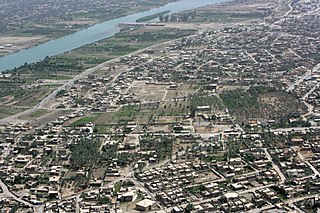
The Battle of Ramadi was a battle launched by the forces of Iraq to successfully recapture the city of Ramadi from the Islamic State of Iraq and the Levant (ISIL), which had taken the city earlier in 2015 in a previous battle. Air power was a major component of the battle, with the United States and other nations conducting over 850 airstrikes in the Ramadi area from July 2015 to late February 2016, and the US crediting airstrikes with 80% of the reason why the city was recaptured. By February 2016, Iraqi forces successfully recaptured the city after two and a half months of fighting. It was predicted that it would take several months to clear the city of the bombs ISIL left behind, with at least 9 months needed to clear the city's Tamim District. At the time, Ramadi had suffered more damage than any other city or town in Iraq.

The Anbar campaign (2015–2016) was a military campaign launched by the Iraqi Armed Forces and their allies aimed at recapturing areas of the Anbar Governorate held by the Islamic State of Iraq and the Levant (ISIL), including the city of Ramadi, which ISIL seized earlier in 2015. The United States and other nations aided Iraq with airstrikes.
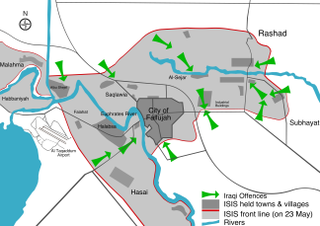
The siege of Fallujah was an offensive that the Iraqi government launched against ISIL in Al-Karmah and in the city of Fallujah, with the aim of enforcing a siege of Fallujah. During the operation, local Sunni residents revolted against ISIL for a period of 3 days, in February 2016. On 22 May, after completing preparations around the city, the Iraqi Army and supporting Shi'ite militias launched the Third Battle of Fallujah.
The Battle of Hit, code named Operation Desert Lynx by Iraqi forces, was an offensive launched by the Iraqi Government during the Anbar offensive, with the goal of recapturing the town of Hīt and the Hīt District from ISIL. After the Iraqi forces recaptured the city of Ramadi, Hīt and Fallujah were the only cities still under the control of ISIL in the Al Anbar Governorate. Iraqi Forces fully recaptured of Hīt and the rest of the Hīt District on 14 April 2016.
This is a timeline of events during the War in Iraq in 2016.
Albu Shajal is a village in Iraq, which is located in the Al Anbar Governorate north west of the city of Fallujah between Habbaniyah and Saqlawiyah, on the north bank of the river Euphrates.

The Battle ofAr-Rutbah was a military offensive in Iraq launched by the Iraqi Army to recapture the strategic town of Ar-Rutbah from ISIL, along with the rest of the Ar-Rutba District.
Malahma is a village in Iraq, which is located in the Al Anbar Governorate north west of the city of Fallujah, north of Habbaniyah and river Euphrates, and west of Albu Shejel. West of Malahma lies Khalidiya Island.
Khalidiya Island is a river peninsula and populated area in Al-Anbar Province, in central Iraq.

The Third Battle of Fallujah, code-named Operation Breaking Terrorism by the Iraqi government, was a military operation against ISIL launched to capture the city of Fallujah and its suburbs, located about 69 kilometres (43 mi) west of the Iraqi capital Baghdad. The operation began on 22 May 2016, three months after the Iraqi forces had started the total siege of Fallujah. On 26 June, Iraqi forces recaptured the city of Fallujah, before recapturing the remaining pocket of ISIL resistance in Fallujah's western outskirts two days later.
Albu Ubeid is a village in Iraq, which is located in the Al Anbar Governorate north west of the city of Fallujah and east of Ramadi, on the river Euphrates. To the east lies Albu Bali, to the south Juwaybah. To the west lies Albu Aitha.
Albu Nasir is a village in Iraq, which is located in the Al Anbar Governorate north west of the city of Fallujah and east of Ramadi, on a loop of the river Euphrates. To the north lies Albu Bali, to the east Baaran and the Khalidiya Island area. To the south the town of Khalidiya is located.

The 2017 Western Iraq campaign was the final major military operation of the 2013–2017 war in Iraq, in the western province of Anbar, and on the border with Syria, with the goal of completely expelling ISIL forces from their last strongholds in Iraq.
The Western Anbar offensive (2017) was a military operation by the Iraqi Army against the Islamic State of Iraq and the Levant, in the western districts of the Province of Anbar and on the border with Syria.
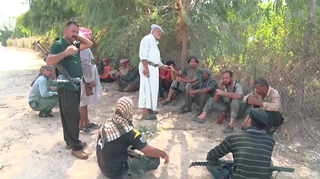
The Islamic State insurgency in Iraq is an ongoing low-intensity insurgency that began in 2017 after the Islamic State (ISIS) lost its territorial control in the War in Iraq. ISIS and allied White Flags fought the Iraqi military and allied paramilitary forces.
References
- ↑ "Albu Bali area". wikimapia.org . 2014. Retrieved 27 October 2019.
- ↑ Silverman, Michael E. (10 October 2011). Awakening Victory: How Iraqi Tribes and American Troops Reclaimed Al Anbar. Casemate. p. 208. ISBN 9781612000978.
- ↑ Adel, Loaa (4 June 2016). "Anbar Operations: 14 ISIS members killed in coalition airstrikes east of Ramadi". Iraqi News . Retrieved 27 October 2019.
- ↑ Abdallah, Amir (2 August 2016). "Interior Ministry achieves success in Khalidiya liberation". Iraqi News . Retrieved 27 October 2019.
Coordinates: 33°26′26″N43°28′32″E / 33.440578°N 43.475515°E